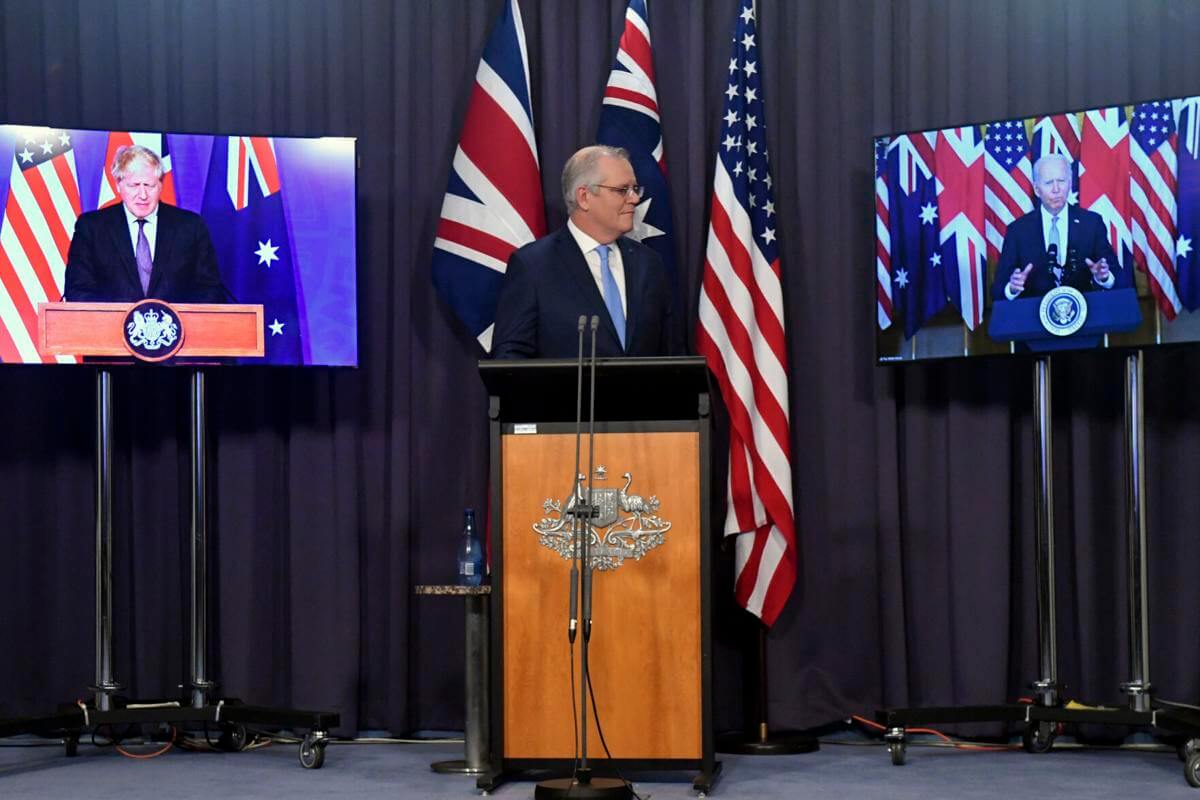Australia, the United States (US), and the United Kingdom (UK) announced a new trilateral security partnership on Thursday to counter China’s growing influence in the Indo-Pacific region.
The new alliance, known as AUKUS, allows Australia to build at least eight nuclear-powered submarines, the technology for which will be shared by the UK and the US for the first time. Over the next 18 months, all three nations will discuss various aspects of delivering these submarines that will likely arrive by the mid to late 2030s.
The agreement also includes sharing other advanced technologies such as unmanned undersea vessels, artificial intelligence, long-range missiles, and offensive cyber capabilities.
US President Joe Biden hailed the new partnership and stressed the importance of maintaining peace and stability in the Indo-Pacific region. He said, “We need to be able to address both the current strategic environment in the region and how it may evolve, because the future of each of our nations, and indeed the world, depends on a free and open Indo-Pacific.”
In a joint statement, Australian Prime Minister (PM) Scott Morrison called the agreement “single greatest initiative” in the country’s national security alliance. “The relatively benign environment we have enjoyed in many decades in our region is behind us. We have entered, no doubt a new era, with new challenges for Australia and our partners and friends and countries right across our region,” Morrison said.
He revealed that the new fleet of nuclear-powered submarines would be made in the Osborne Naval Shipyard in Adelaide. Morrison also assured Australian citizens that the government does not intend to establish nuclear weapons or civil nuclear capability.
It is believed that the construction of nuclear submarines would not affect Australia’s international nuclear non-proliferation agreements. However, the government might have to revise domestic laws governing nuclear power to build and operate submarines domestically.
British PM Boris Johnson also highlighted that the deal does not violate nuclear non-proliferation treaties. He emphasised that “the submarines in question will be powered by nuclear reactors—not armed with nuclear weapons.”
Commenting on the landmark agreement, New Zealand’s PM, Jacinda Ardern, said, “We welcome the increased engagement of the UK and the US in the region and reiterate our collective objective needs to be the delivery of peace and stability and the preservation of the international rules-based system.” However, she refused to allow Australia’s nuclear submarine fleet into New Zealand’s waters, as the country has been nuclear-free since the 1980s.
Meanwhile, the development has infuriated France, as Australia abandoned a $90 billion future submarine deal with the former for this new military alliance. Foreign Minister Jean-Yves Le Drian and Armed Forces Minister Florence Parly said, “This decision is contrary to the letter and spirit of the co-operation that prevailed between France and Australia.”
The partnership will likely cost Australian taxpayers billions of dollars, as the French builder, Naval Group, had already begun the work and is entitled to compensation. Naval Group expressed disappointment on the decision and said, “Naval Group was also offering Australia a sovereign submarine capability making unrivalled commitments in terms of technology transfer, jobs and local content.”
Similarly, the Chinese embassy in Washington said that “the US, the UK, and Australia needed to shake off their Cold War mentality and ideological prejudice.” A spokesperson said, “They [countries] should not build exclusionary blocs that harm the interests of third parties.”
Apart from international criticism, Australia also faces domestic disapproval, with Senators and opposition leaders calling for an urgent inquiry into the deal.
“If it’s a US submarine, they have highly enriched uranium in their reactors, and that creates a proliferation issue in terms of Australia standing up saying, ‘No-one should have this sort of fuel available to them,’” senator Rex Patrick said. “Yet, we might end up having to have that on our submarines,” he added.
Labor Party leader Anthony Albanese also called for a joint mechanism between senior government members and the opposition to give bipartisan oversight of the partnership. “We need to know the full cost of the abandonment of the existing programme, but we also need to know what the cost of the proposed programme would be... given that the proposal is that the new submarines would not be in the water until 2040,” Albanese said.

